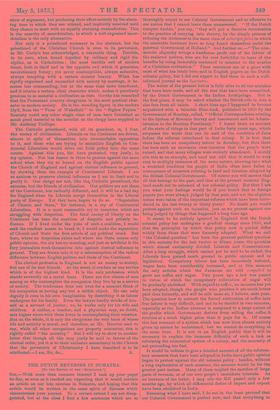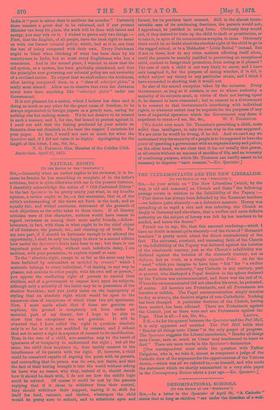THE DUTCH REVERSES IN SUMATRA.
[TO THE EDITOR OF THE "SPECTATOR."] SIR, —With more than common interest I took up your paper to-day, as soon as it-reached me, expecting that it would contain an article on our late reverses in Sumatra, and hoping that this article would be written in the same spirit of fairness which characterises your journal. To a certain extent I am not disap- pointed, but at the close I find a few sentences which are so
thoroughly unjust to our Colonial Government and so offensive to our nation that I cannot leave them unanswered. "If the Dutch conquer Atchin," you say, "they will put a decisive termination to the practice of carrying into slavery, by the simple process of reducing the Atchinese to the same class of adscripti glebx in which the miserable Javanese have so long found themselves under the paternal Government of Holland." And further on,—" The com- mercial oligarchy wrings a handsome profit out of the labour of the enslaved natives, who are for ever forbidden to taste of the benefits by being inexorably sentenced to minister to the avarice of a Christian civilisation." These sentences are of a piece with most of what has lately been said in English papers on the Dutch colonial policy, but I did not expect to find them in such a well- informed journal as the Spectator.
The writer of the present letter is fully alive to all the mistakes that have been made, and all the sins that have been committed, by the Dutch Government in the Indian Archipelago. But in the first place, it may be asked whether the British rule in Asia is also free from all taints. A short time ago I happened to become acquainted with a valuable Blue-book, published in 1869 by the Government of Bombay, called, "Official Correspondence relating to the System of Revenue Survey and Assessment and its Admin- istration in the Bombay Presidency." I found there an account of the state of things in that part of India forty years ago, which surpasses the worst that can be said of the condition of Java before the reforms introduced in that colony. It is true that there has been no compulsory labour in Bombay, but then there has been such an enormous over-taxation that the people were ruined, and that many villages were entirely abandoned. I merely cite this as an example, and need not add that it would be very easy to multiply instances of the same nature, showing into what a wretched condition the people of India often have fallen in consequence of measures relating to land and taxation adopted by the British Colonial Government. Of course you will answer that all this belongs to the past, and that at the present moment Eng- land needs not be ashamed of her colonial policy. But then I ask you what your feelings would be if you found that in foreign papers you were always judged by that past, and not the slightest notice were taken of the important reforms which have been intro- duced in the last twenty or thirty years? No doubt you would protest against such an injustice, just as we protest against our being judged by things that happened a long time ago.
It seems to be entirely ignored in England that the Dutch colonial policy has undergone a gradual change since 1850, and that the principles by which that policy now is guided differ widely from those that were formerly adopted. What we call "the Colonial question" has been the greatest political question in this country for the last twelve or fifteen years, the question which almost exclusively divided Liberals and Conservatives. After a long struggle, which cannot yet be said to be ended, the Liberals have gained much ground in public opinion and in legislation. Compulsory labour has been immensely reduced, wages have been considerably increased, and at this moment the only articles which the Javanese are still compelled to grow are coffee and sugar. Two years ago a law was passed in virtue of which the compulsory cultivation of sugar will be gradually abolished. With regard to coffee, no measure has yet been adopted, though the people who produce it are much better paid than formerly, and will be still more so, I believe, next year. The question how to convert the forced cultivation of coffee into free labour is very difficult, and not to be decided in two minutes, especially as the Indian revenue is composed to a large extent of the profits which Government derives from selling the coffee it receives at a much higher price than it pays for it. Of course this last remnant of a system which has now been almost entirely given up cannot be maintained, but we cannot do everything at the same time. It is not to an English public that it will be necessary to explain the immense difficulty of such a task as reforming the economical system of a colony, and the necessity of not proceeding too fast.
It would be tedious to give a detailed account of all the reforma- tory measures that have been adopted in India since public opinion began to protest against the old colonial policy ; besides, without a long explanation of each measure, the account would be for the greater part useless. Many of them implied the sacrifice of large parts of revenue, or of our own people's immediate interests. As an instance of the latter, I may cite the Bill passed only a few months ago, by which all differential duties of import and export have been abolished in India.
Resuming what I have said, I do not in the least pretend that our Colonial Government is perfect now, and that everything in India is "pour le mieux dans le meilleur des mondes." Certainly there remains a great deal to be reformed, and if our present Minister can keep his place, the work will be done with talent and energy, you may rely on it. I wished to prove only two things:— First, that the English, of all people, have the least right to taunt us with our former colonial policy, which, bad as it is, can bear the test of being compared with their own. Every Dutchman ought to blush when thinking of what has been done by his countrymen in India, but so must every Englishman who has a conscience. And in the second place, I wanted to show that the old system, as a system, has been gradually abandoned, and that the principles now governing our colonial policy are not unworthy of a civilised nation. rfo expect that we shall reduce the Atchinese, after having conquered them, to a "class of adscripti glebe," is really most absurd. Allow me to observe that even the Javanese never have been anything like " adscripti glebte" under our Government.
It is not pleasant for a nation, which I believe has done and is doing as much as any other for the great cause of freedom, to be always represented in foreign papers as a greedy race, caring for nothing else but making money. We do not deserve to be treated in such a manner, and I, for one, feel bound to protest against it. I need not add that the feeling produced by your article on Sumatra does not diminish in the least the respect I entertain for your paper. In fact, I would not care so much for what the Spectator said, if I did not value it so highly. Apologising for the length of this letter, I am, Sir, &c.,



































 Previous page
Previous page